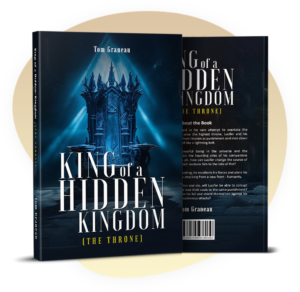In Tom Graneau’s King of a Hidden Kingdom: THE THRONE, the banished angels’ journey from the celestial glory of Heaven to the desolation of Hell is both tragic and transformative. Stripped of their radiance and cast into a barren realm, these fallen beings must grapple with the consequences of their rebellion. The book explores how the exiled angels, under Lucifer’s leadership, redefine their purpose in a world far removed from the splendor they once knew.
The Shock of Exile
The story begins with the angels’ swift expulsion from Heaven, a direct consequence of their allegiance to Lucifer. Graneau vividly depicts the fall as a fiery descent, marked by confusion, pain, and loss. Heaven, once their eternal home, becomes a distant memory, replaced by the oppressive landscapes of Hell. The contrast between the celestial and infernal realms highlights the enormity of their fall, both in status and environment.
For the angels, exile is not only a physical displacement but also a profound existential crisis. Stripped of their divine purpose, they must confront their new reality as outcasts. The transformation of their forms into demonic appearances reflects the inner corruption brought about by their rebellion.
Lucifer’s Leadership in Hell
Amidst the despair of exile, Lucifer emerges as a unifying force for the fallen. Though defeated, he refuses to accept failure, rallying his followers with promises of vengeance and dominion. Graneau portrays Lucifer as a figure of resilience and cunning, channeling his rage into the establishment of a new kingdom.

Lucifer’s throne, made of jagged stone and inscribed with “King of a Hidden Kingdom,” becomes a symbol of defiance. While it is initially a reminder of his lost glory, it soon transforms into a seat of power. He begins to organize Hell into a structured realm, assigning roles and responsibilities to his followers. This reorganization provides the fallen angels with a renewed sense of purpose, albeit one rooted in rebellion and darkness.
The Redefinition of Purpose
The fallen angels’ redefined purpose is tied to Lucifer’s ultimate goal: to corrupt humanity and undermine God’s creation. Each angel becomes a soldier in this cosmic battle, contributing to the strategies that seek to exploit human free will. Graneau’s portrayal of Hell’s cities, each designed to house souls according to their sins, underscores the efficiency and focus of their efforts.
The angels’ transformation into demons is not merely physical; it reflects their embrace of a new identity. In their rebellion, they find purpose in opposition, redefining themselves as adversaries of divine order. Their despair is tempered by their collective resolve to challenge God’s authority, with Lucifer as their charismatic leader.
The Emotional and Spiritual Toll
Despite their newfound purpose, the emotional and spiritual toll of exile remains palpable. Graneau’s descriptions of the Bottomless Pit, where some of the most rebellious angels are imprisoned, serve as a chilling reminder of the consequences of their actions. The cries from the pit echo throughout Hell, a haunting soundtrack to their eternal separation from God.
Yet, the narrative also captures moments of reflection and regret among the fallen. While their rebellion defines their present, the memories of Heaven linger, adding depth to their characterization. This duality—regret mingled with defiance—humanizes the fallen angels and underscores the complexity of their plight.
Lessons from the Fallen
Graneau’s depiction of the fallen angels in King of a Hidden Kingdom offers profound insights into the nature of loss and resilience. Their ability to adapt to their new reality, despite its harshness, reflects a universal truth: even in the face of failure, beings strive to find meaning and purpose. However, the angels’ story also serves as a cautionary tale about the consequences of pride and rebellion.
The narrative invites readers to consider their own responses to failure and loss. It challenges them to reflect on whether they, like the fallen angels, seek purpose in defiance or redemption. Ultimately, King of a Hidden Kingdom reminds us that even in the darkest realms, the choices we make define who we are and what we become.